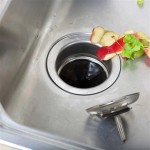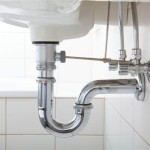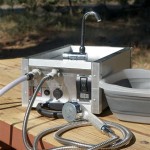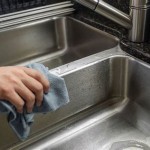Smell From Kitchen Sink Drain
A foul odor emanating from the kitchen sink drain is a common household problem. This unpleasant smell can range from a mild mustiness to a pungent, rotten egg-like stench, indicating various underlying issues within the plumbing system. Understanding the potential causes allows for effective troubleshooting and resolution.
One of the most frequent culprits is a buildup of food debris within the drain. Small particles of food can become trapped in the garbage disposal, drain pipes, or the P-trap. As these particles decompose, they release foul-smelling gases, leading to the noticeable odor. Regular cleaning of the garbage disposal and flushing the drain with hot water can help prevent this buildup.
Another common cause is a dried-out P-trap. The P-trap is a U-shaped pipe located beneath the sink, designed to hold a small amount of water. This water creates a seal that prevents sewer gases from rising up through the drain. If the P-trap dries out due to infrequent sink usage, the seal is broken, allowing sewer gases to escape and cause an unpleasant smell.
Biofilm accumulation is another potential source of the odor. Biofilm is a slimy layer composed of bacteria, fungi, and other microorganisms that can thrive in moist environments like drain pipes. This biofilm can trap food particles and other organic matter, contributing to the decomposition process and the resulting smell. Regular cleaning with baking soda and vinegar or a commercial drain cleaner can help break down and remove biofilm.
Clogs within the drain pipes can also lead to unpleasant smells. A clog restricts water flow, allowing stagnant water to accumulate. This stagnant water becomes a breeding ground for bacteria and other microorganisms, leading to the production of foul-smelling gases. Using a plunger or a drain snake can help dislodge clogs and restore proper drainage.
In some cases, the smell may originate from the vent pipe. The vent pipe allows air to enter the drainage system, preventing pressure buildup and ensuring proper drainage. If the vent pipe is blocked by debris, such as leaves or bird nests, it can disrupt the airflow and cause sewer gases to back up into the drain, resulting in a noticeable odor. Clearing any obstructions in the vent pipe is essential to resolving this issue.
A less common, but potentially more serious, cause is a problem with the sewer line itself. A crack or blockage in the sewer line can allow sewer gases to escape into the home through the kitchen sink drain. This problem typically requires professional plumbing intervention to diagnose and repair.
Incorrectly installed plumbing can also contribute to drain odors. If the pipes are not properly sealed or vented, it can allow sewer gases to escape into the home. A professional plumber should inspect the plumbing system to identify and correct any installation errors.
Hard water can sometimes exacerbate drain odors by contributing to mineral buildup within the pipes. These mineral deposits can trap food particles and other organic matter, providing a breeding ground for bacteria and contributing to the smell. Regularly cleaning the pipes with a descaling solution can help prevent mineral buildup.
Garbage disposals, while designed to grind food waste, can sometimes contribute to drain odors. Food particles can become lodged in the disposal chamber or the grinding components, leading to decomposition and unpleasant smells. Regularly cleaning the garbage disposal with baking soda and vinegar, ice cubes, or citrus peels can help remove trapped food particles and neutralize odors.
Identifying the specific source of the smell is crucial for effective remediation. If simple cleaning methods fail to eliminate the odor, it is advisable to consult a qualified plumber to investigate and address any underlying plumbing issues.
Preventive measures can significantly reduce the likelihood of encountering drain odors in the future. These measures include regularly flushing the drain with hot water, cleaning the garbage disposal, avoiding pouring grease down the drain, and using drain strainers to catch food particles.
Addressing a smelly kitchen sink drain promptly is essential not only for eliminating the unpleasant odor but also for maintaining a healthy and hygienic kitchen environment. By understanding the potential causes and implementing appropriate solutions, homeowners can effectively tackle this common household problem.

Deodorize A Kitchen Sink That Smells 5 Ways

Stinky Sink Here S What Causes A Foul Drain Smell

How To Fix Smelly Sink Drains Using At Home Blockbusters

Why Does My Kitchen Sink Smell Like Sewer Mike Diamond

How To Clean A Stinky Sink Drain

How To Clean A Smelly Drain Easy Diy Fixes For Foul Odors

How To Get Rid Of The Bad Smell In Kitchen Sink

How To Clean A Smelly Drain Easy Diy Fixes For Foul Odors

How To Remove Musty Odors From Kitchen Sink Water Damage

Unpleasant Drain Odor Identifying The Offenders







